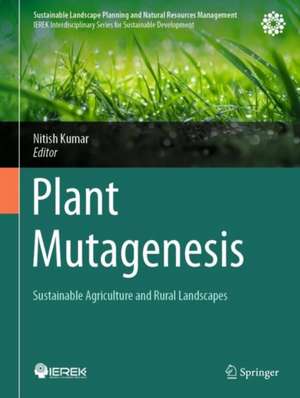Plant Mutagenesis: Sustainable Agriculture and Rural Landscapes: Sustainable Landscape Planning and Natural Resources Management
Editat de Nitish Kumaren Limba Engleză Hardback – 23 apr 2024
This approach has significantly boosted the economies of nations like China, India, Japan, Pakistan, and the USA. As of right now, the strategy has produced and disseminated more than 3600 mutant types in the majority of crop plants, having a significant economic impact. This book discusses several mutation induction techniques, mutant screening, genome editing, the haploid breeding system for mutations, as well as genomic developments, and mutant gene identification. Plant breeders, researchers, and students in the fields of plant sciences, agriculture, and food science will find this instructive book to be of great help.
Preț: 1393.27 lei
Preț vechi: 1699.11 lei
-18% Nou
Puncte Express: 2090
Preț estimativ în valută:
266.63€ • 289.53$ • 223.97£
266.63€ • 289.53$ • 223.97£
Carte disponibilă
Livrare economică 01-15 aprilie
Preluare comenzi: 021 569.72.76
Specificații
ISBN-13: 9783031507281
ISBN-10: 3031507282
Pagini: 217
Ilustrații: XI, 217 p. 25 illus., 18 illus. in color.
Dimensiuni: 210 x 279 mm
Greutate: 0.79 kg
Ediția:2024
Editura: Springer Nature Switzerland
Colecția Springer
Seria Sustainable Landscape Planning and Natural Resources Management
Locul publicării:Cham, Switzerland
ISBN-10: 3031507282
Pagini: 217
Ilustrații: XI, 217 p. 25 illus., 18 illus. in color.
Dimensiuni: 210 x 279 mm
Greutate: 0.79 kg
Ediția:2024
Editura: Springer Nature Switzerland
Colecția Springer
Seria Sustainable Landscape Planning and Natural Resources Management
Locul publicării:Cham, Switzerland
Cuprins
1. Application of Mutagenesis in food production and sustainable development.- 2. Recent Perspectives of Mutation Breeding for Crop Improvement.- 3. Mutagenesis Breeding for Drought-Tolerance and Improvement of Oil and Seed Quality in Oilseed Crops: Case of Rapeseed and Sesame.- 4. Intellectual property over mutant and gene edited plants.- 5. Genome editing based CRISPR system in crop improvement.- 6. Haploids system in mutation breeding.- 7. Use of chemical mutagens in field crop breeding.- 8. Application of somaclonal variations in crop improvements.- 9. Improvement in fruit crop plants through mutation breeding.- 10. Application of In Vitro Mutagenesis in Plant Tissue Culture for Genetic Improvement of Crop Plants.- 11. Use of Gamma Irradiation in Crop Mutation Breeding.- 12. Genetic Improvement of Rural Landraces through Mutation Research.- 13. Development of Rural Landraces through Mutation Breeding Approaches.- 14. Application of Mutagenesis and Genome editing in crop Plants.- 15. Mutagenesis- A Tool for Improving Rice Landraces.- 16. The development of improved landraces in agriculture for rural development.
Notă biografică
Nitish Kumar is Senior Assistant Professor at the Department of Biotechnology, Central University of South Bihar, Gaya, Bihar, India, since last 12 years. Dr. Kumar completed his doctoral research at the Council of Scientific & Industrial Research–Central Salt & Marine Chemicals Research Institute, Bhavnagar, Gujarat, India. He has a wide area of research experience in the field of crop improvement using plant biotechnology and mutation breeding techniques. He has published more than 70 research articles in leading international and national journals, more than 20 book chapters, and 7 books with Springer and Taylor & Francis. Dr. Kumar is Recipient of the Young Scientist Award from the Science and Engineering Research Board (SERB) in 2014. He has received many awards/fellowships/projects from various prestigious Indian government organizations like CSIR, DBT, ICAR and SERB-DST, BRNS-BARC, among others. He is Reviewer for various international journals and serves as Associate Editorof the journal Gene (Elsevier).
Textul de pe ultima copertă
This book emphasizes recent developments in the use of mutation technologies for crop plant improvement and, ultimately, sustainable development. Plant breeders use genetic variation, which is created by plant-induced mutation, to create new and improved cultivars. The development of improved cultivars is a productive and optimistic agricultural strategy for economic and environmental sustainability since it ensures high yield stability, enhances soil health, and poses no environmental risks. Understanding mutation induction and exploring its uses have paved the road for improving genetic diversity for different plants and agronomic features and advanced gene discovery for diverse qualities that aid in sustainable development. Plant mutation breeding imitates spontaneous mutation, the primary force driving evolution, by using a plant's own genetic resources instead of genetic transformation. In order to develop beneficial agricultural features, this strategy focuses on the application of various chemical and physical mutagens in conjunction with biotechnologies. In order to survive in challenging environments, increase nutritional value, fight diseases and pests, grow in salty soils, and utilize water and nutrients more effectively, new varieties of plants are developed.
This approach has significantly boosted the economies of nations like China, India, Japan, Pakistan, and the USA. As of right now, the strategy has produced and disseminated more than 3600 mutant types in the majority of crop plants, having a significant economic impact. This book discusses several mutation induction techniques, mutant screening, genome editing, the haploid breeding system for mutations, as well as genomic developments, and mutant gene identification. Plant breeders, researchers, and students in the fields of plant sciences, agriculture, and food science will find this instructive book to be of great help.
This approach has significantly boosted the economies of nations like China, India, Japan, Pakistan, and the USA. As of right now, the strategy has produced and disseminated more than 3600 mutant types in the majority of crop plants, having a significant economic impact. This book discusses several mutation induction techniques, mutant screening, genome editing, the haploid breeding system for mutations, as well as genomic developments, and mutant gene identification. Plant breeders, researchers, and students in the fields of plant sciences, agriculture, and food science will find this instructive book to be of great help.
Caracteristici
Describes the importance of mutation in crop plant research and its application to enhance the crop productivity Provides insight into what may lie ahead in the rapidly expanding area of mutation breeding in crop research development Highlights new advances in the understanding of improved cultivar in sustainable development



